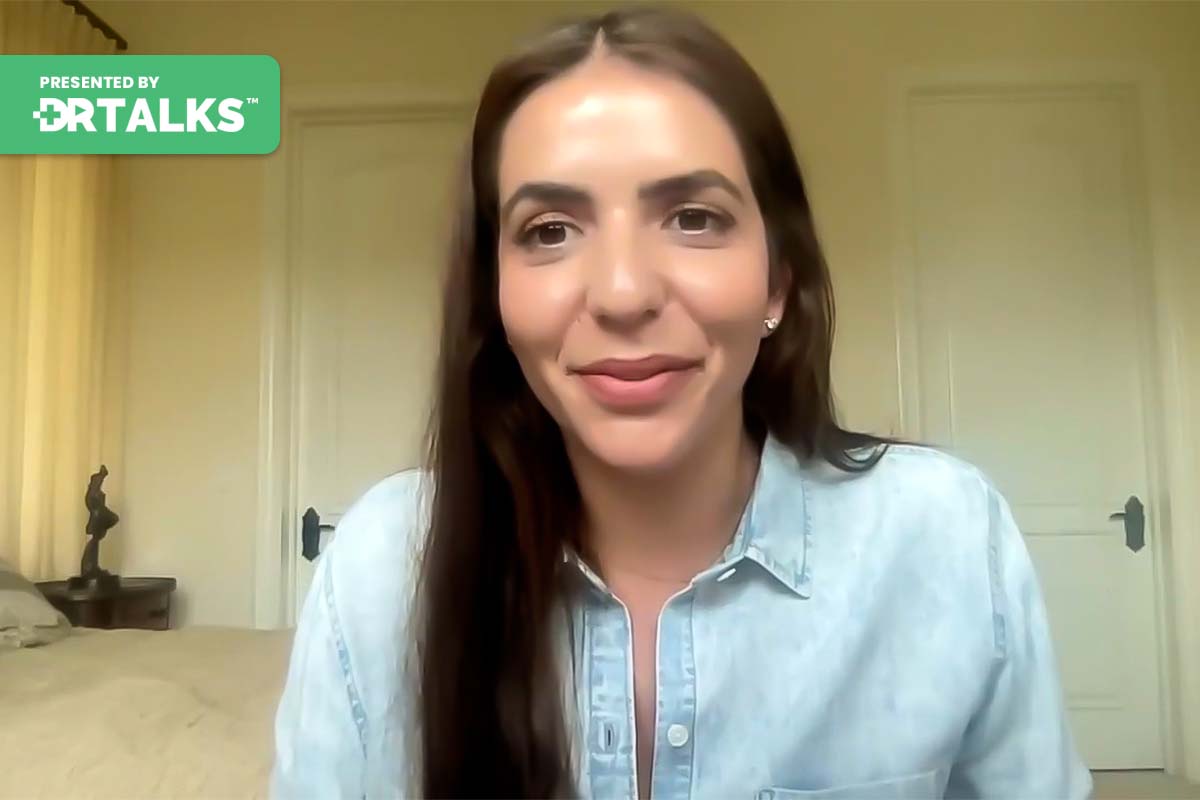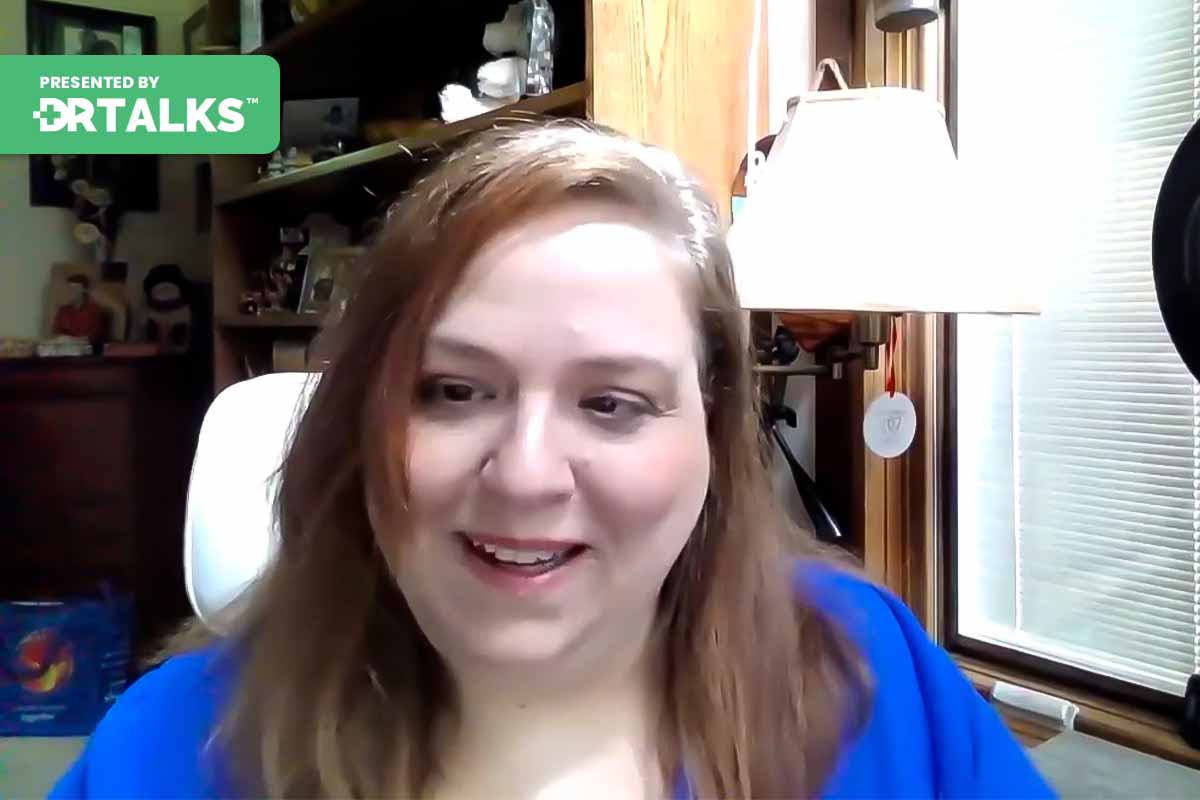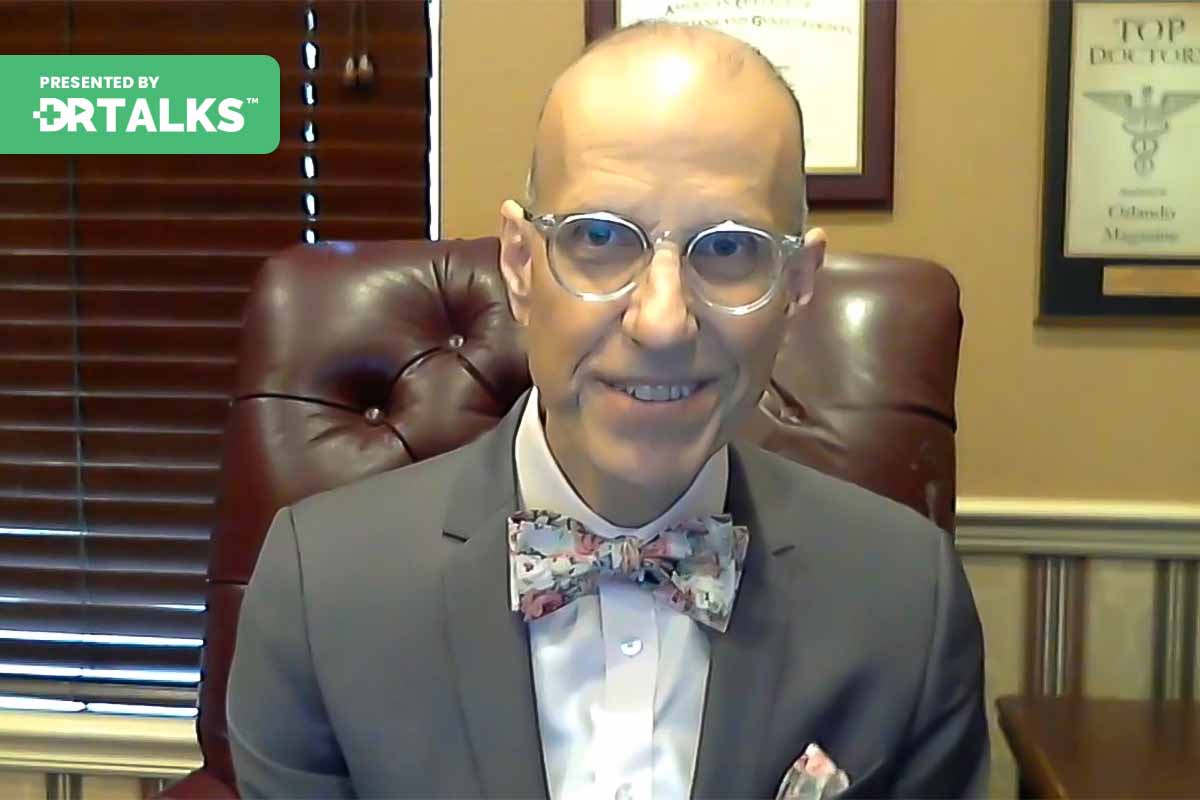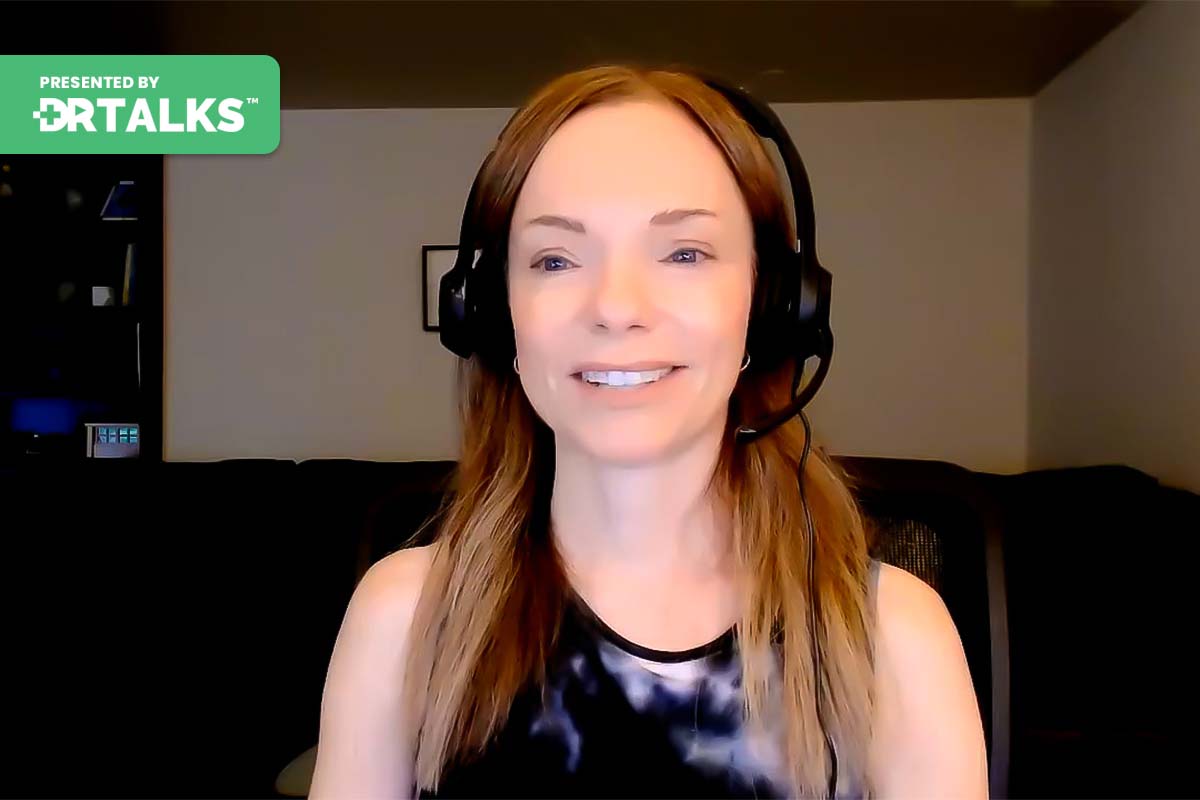Join the discussion below

Felice Gersh, MD is a multi-award winning physician with dual board certifications in OB-GYN and Integrative Medicine. She is the founder and director of the Integrative Medical Group of Irvine, a practice that provides comprehensive health care for women by combining the best evidence-based therapies from conventional, naturopathic, and holistic... Read More
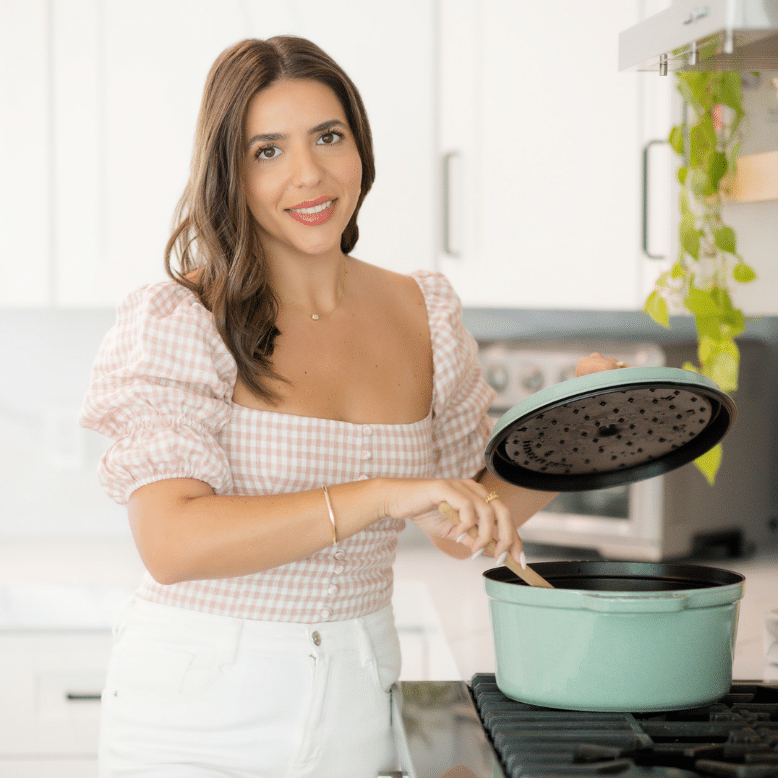
Tallene is a PCOS Weight Loss Registered Dietitian and a strong believer that you don’t just have to live with PCOS, you can thrive with PCOS. She was diagnosed at age 18, and left scared and confused without much information or guidance from her practitioner. Unsatisfied with the generally accepted... Read More
- Understand the interrelation between insulin resistance, diet, and PCOS
- Learn how a gluten and dairy-free diet can aid in managing PCOS, inflammation, and hyperandrogenism
- Discover the impact of diet and lifestyle changes on PCOS weight loss
- This video is part of the PCOS SOS Summit
Related Topics
Anxiety, Bloated, Blood Sugar, Body Composition, Carbohydrate Breakdown, Cortisol, Cortisol Dysregulation, Cortisone Insulin Dysregulation, Cystic Acne, Dairy Sensitivity, Diet And Lifestyle Changes, Diet And Lifestyle Tweaks, Fatty Liver, Fault, Gluten Sensitivity, Gynecologist, Hair Loss, Hair Problems, High Testosterone, Hormonal Imbalances, Inflammation, Inflammatory Response, Insulin Resistance, Insulin Resistance Effects, Insulin Resistance Explained, Journey, Learning, Midsection Weight Gain, Nutrition-based Approach, Ovarian Cysts, Ovary Symptoms, PCOS, Perfect Storm, Poor Sleep, Puffy, Refined Carbohydrates, Registered Dietitian, Reverse Symptoms, Reversing Ovarian Cysts, Ruptured Ovarian Cyst, Skin Inflammation, Skin Problems, String Of Pearls, Sugar Metabolism, Unbalanced Cortisol, Visceral Fat, Weight LossFelice Gersh, MD
Welcome to this episode of the PCOS SOS Summit. I am your host, Dr. Felice Gersh. With me is an amazing, innovative woman, one of the few nutrition experts, a dietitian who specializes in PCOS weight loss, and the founder of PCOS Cysterhood, a weight loss app for women with PCOS. Her name is Tallene Hacatoryan. She is so amazing. You are going to love this interview. Welcome, Tallene. Thank you so much for joining me on this episode.
Tallene Hacatoryan, MS, RD
Thank you so much for having me. Dr. Gersh, this is such an honor. Honestly, I have loved being one of your patients and reading your book. I am excited to have a chance to chat with you about PCOS weight loss.
Felice Gersh, MD
Well, the first thing I really would love for you to share with all of our viewers is your personal story. Your journey is so powerful, and really, it is empowering how you went on this journey to deal with your problems and how you got into this field. Share your story, please.
Tallene Hacatoryan, MS, RD
Sure. About ten years ago, I had a ruptured ovarian cyst, and that just sent me straight to the emergency room, where I figured out one of the doctors told me I had PCOS. When I went to the gynecologist, the gynecologist told me to take birth control and just come back when I wanted to get pregnant and think nothing of it. But after a while of taking birth control, I realized that I was just suppressing all of my hormonal imbalances. It was just covering everything up. I did not know what was going on.
I quickly came off of it and started managing, learning how to manage my symptoms. It took me a while to figure things out because I struggled with cystic acne, anxiety, hair loss, and especially weight gain despite eating what I thought was healthy and what was a lot healthier than the people around me, and it was so funny to see how devastating is the better adjective, to see how I would gain weight so quickly, and I had no idea what was going on. I finally figured out the root issues that were driving my PCOS symptoms. Specifically, the insulin resistance, the inflammation, and how that was creating this perfect storm for having high testosterone and all of the symptoms that I was facing, along with a lot of diet and lifestyle tweaks and changes and just figuring out what works for my body. I was able to reverse my symptoms.
Felice Gersh, MD
Wow. I am sitting here and I bet everyone else is looking at you, and they are saying to themselves, But wait a minute, look at Tallene. She has gorgeous hair and skin. She does not look particularly overweight. Describe again a little bit: where were you at the beginning of your journey in terms of weight, skin, and hair? A little bit more so, and then talk about the transformation that you went through with your own body.
Tallene Hacatoryan, MS, RD
Yes, well, I was around 30 or 40 pounds heavier, and I felt puffy and bloated all the time. My skin felt puffy overall with my face, chest, hands, and waist especially, and everything I ate made me feel so bloated, and I just felt swollen all the time. They also manifested in my skin. The inflammation, the swelling. Not only was my face bloated, but I also had really bad cystic acne, so deep and painful and all over my cheeks and forehead. You would not recognize me if you saw me. I do not need it. I wish I had a picture, but it is not even the worst picture that I could have taken of my skin because it was just so painful. not to mention the ovarian cysts and the string of pearls that were on my ovaries.
I was told I could not reverse that as well. I was told that I was just part of it. With the diet and lifestyle changes that I am sure we will talk about in this episode, I was able to shrink and reverse them, and they are not there anymore. It is something that I just had no idea would be possible when I was first diagnosed because I was in such a state that I was so used to feeling a certain way. I could not even imagine feeling better because it had been so long that I was suffering from the symptoms; my hair was falling out in clumps and not growing back. It was just that the hairbrush was thick with hair. I could not believe how quickly everything was deteriorating, especially right after I got off of birth control. It was like everything just shot up after being suppressed for such a long time. Not to mention, when I was eating, I thought that I was eating healthy. I was having a sandwich, I was having a salad, and I was having healthy snacks. But I never realized how many carbs I was eating or how often I was eating, and how that was affecting my blood sugar and creating this insulin resistance. That was just inflammation from the food that I was choosing, gluten and dairy specifically, which I was very sensitive to at the time, and how it was creating this perfect storm for inflammation, insulin resistance, and therefore all of these symptoms.
Felice Gersh, MD
Now, I know you went to school and became a registered dietitian, so was that helpful for you in terms of learning all the things that you have applied, or did you have to go out and discover for yourself how women with PCOS would be best served by their diet?
Tallene Hacatoryan, MS, RD
Yes, when I was diagnosed, it shot me in that direction. I need to figure out what is going on. I thought becoming a registered dietitian would be the best thing for me. But as it turns out, what we were learning was probably two slides on a PowerPoint about PCOS, first of all, and I do not even remember having a chapter about or reading about it in a book or spending time on it. It is so funny because this is something that affects one in five or one in 10 women and impacts their quality of life. The first line of approach is diet and lifestyle changes. What did you not think a registered dietitian would study for—a whole semester on PCOS? But I did not learn a lot of the things that I know now. Today I had to dig them up partially from your book, from studies, from research done on PCOS in women, and dove into it to learn about the effects that insulin resistance has on your hormones and all of the different lifestyle changes that can affect insulin resistance that you might not even realize or think are a big deal can shift the trajectory of your symptoms significantly.
Felice Gersh, MD
Well, I am with you in that I have done so often in the past, and it is a little bit different but not where it should be. Information about PCOS in medical textbooks and dietitian textbooks—it’s almost a footnote. It is a paragraph. It is amazing for the most common endocrine disorder in women. Since 80% of women who suffer from PCOS have weight challenges, it is so important for them to hear, Well, tell us, What do you think of every woman with PCOS who has a weight challenge, but not even just that? Maybe they have problems with just visceral fat, they are thin, but they do not have the best body composition, or they have skin and hair problems. Where should they start? Let us start with your foundational knowledge base to share. What should these women know?
Tallene Hacatoryan, MS, RD
These women are struggling with losing weight with PCOS. The first thing to know is that it’s not your fault. It is not your fault that you gained weight. You did not just eat too much and gain weight. It is a concoction of hormonal issues. There are two main hormones, that drive PCOS weight gain: cortisol and insulin. We have insulin resistance and when we have cortisol, which is our stress hormone, dysregulated. These two hormones have a huge impact on how we pack on weight without even trying, without even eating too much. Whether it is genetic or if it is something that is easily triggered by your environment or your lifestyle, this can create a dysregulation in cortisone insulin and make you gain weight in the midsection, make you feel bloated all the time, and not be able to metabolize the food that you are eating and naturally lose weight, as your body should naturally be able to do. It halts that. 80% of women with PCOS have insulin resistance. When should I go into insulin resistance and explain how it works?
Felice Gersh, MD
Absolutely. Just okay. The ABCs of insulin resistance.
Tallene Hacatoryan, MS, RD
Okay. I have to ask because, honestly, I slingshot myself into the insulin resistance story, and then I went down this rabbit hole. I ask if this is something you want me to go into. But when we eat something containing carbs, when we eat sugar, when we eat anything that breaks down into sugar-containing carbs, then our body takes that sugar. Our body releases insulin from our pancreas. The insulin hormone takes that sugar and gives it to our cells so they can burn it for energy. But over time, if we eat too many carbs, we are genetically predisposed to insulin resistance. If we have a diet full of carbs, sugar, and other things that can trigger your cells to become insulin resistant.
Also, inflammation can trigger that and exacerbate it. If you are sensitive to foods like gluten and dairy and that is creating an inflammatory response in your body, then your cells are less likely to be insulin sensitive. Insulin is trying to give your cells that sugar to burn it for energy to metabolize it. But when your cells are locked up and resistant to insulin, then that sugar goes and is stored as fat. It stores around your liver, and you can see it manifest as a fatty liver, and that excess insulin triggers high testosterone in the ovaries. That high testosterone is where some of the PCOS symptoms start showing up. You see ovarian cysts, irregular periods, or symptoms such as anxiety, cystic acne, and hair loss. This is how insulin resistance and high testosterone tie together, create that PCOS effect, and lead to weight gain, especially in the midsection.
Then we have high cortisol, as I mentioned earlier when you have cortisol dysregulation, and this can be influenced by having poor sleep at night, which so many women with PCOS struggle with getting quality sleep. When you have poor sleep regulation, then you have this issue with cortisol, where when you wake up in the morning and it should be high to give you energy and help you pop out of bed, it’s low and you feel tired, fatigued, and sluggish. You are ready for a nap as soon as you wake up. Then at night, when cortisol is supposed to be low, you can relax and go to sleep, and your melatonin can go up. For some reason, it is high so that stops you from being able to sleep. This cortisol dysregulation can also lead to weight gain in the midsection and can lead to anxiety and many other PCOS symptoms. I know in your book you talk about how we have our circadian rhythm, so it is connected to this cortisol issue and not to go down that rabbit hole as well. But your cortisol hormone is very important for your ability to lose weight, and drinking caffeine throughout the day to help you stay awake because you are so tired can make it more difficult for you to sleep at night.
Further progress on that cortisol issue is also working out hard, which is often something that women with PCOS are told to do to lose weight. Going to kickboxing classes, going to back-to-back cycling classes, etc. can kick your cortisol out of control as well. It can make it pump up. Women with PCOS struggle to bring it back down. Then you might find that you are wired, tired, and anxious after your workout. It might mean that your workout was too stressful for you and your body, and it is disrupting your cortisol regulation.
There are so many little factors, even cutting out calories and starving yourself all day, that you could lose weight. That can also disrupt your cortisol regulation. It is so funny because so many things that we are told to do for PCOS—eat less and move more—can sometimes hurt us and push us in the opposite direction, disrupt our cortisol, disrupt our relationship with food, and not provide that knowledge that we need to improve insulin resistance. I think something that would help women with PCOS more is if we were taught how to manage insulin resistance rather than told to just lose weight and stop eating so much. I think that is unfortunate. Leave women with PCOS as soon as they are diagnosed; they are being told that. That creates this cycle of issues that makes it so difficult to lose weight because you create stress around food as well.
Felice Gersh, MD
Well, that is for sure. They have been perpetually advised to just eat less. As you said, It is not going to work. Let us talk about what you recommend in terms of good food choices. I know that eating processed carbs, as you said, is not a good food choice. What would be good food choices for women with PCOS?
Tallene Hacatoryan, MS, RD
I had to start this off by saying it is a good idea to try going gluten and dairy-free, especially for 30 days, to see if it is affecting your body and if it is creating a lot of inflammation. If dairy triggers high antigen levels, gluten can affect your leptin hormone and make you feel hungry all the time. It would be beneficial if you are comfortable, whoever is listening, and if you are comfortable going gluten- and dairy-free, try it for 30 days and see how you feel. Some of the foods that you can eat that are gluten- and dairy-free are starchy vegetables. You could have some sweet potatoes; you could have buckwheat, quinoa, and some grains that I like. You could have beans. These are carbs that also have protein in them. It is a great option. As well as all fruits, vegetables, proteins, chicken, and fish, these are all wonderful options for women with PCOS, especially fatty fish that have lots of omega-3 fats in them.
What is more important is not necessarily the foods you are choosing; of course, the foods you are choosing are very important, but how you are dividing them onto your plate is also very important. I go by the rule where half of my plate is veggies, a fourth of my plate is protein, maybe chicken, maybe fish, and then a fourth of my plate is a carb because I do not want to cut out carbs completely. Then, I do not feel satisfied after my meal. But understanding how much my body can tolerate, starting with filling up a fourth of my plate with carbs and seeing how I feel after that meal will help me discover my carb tolerance, which is something I think is really important for PCOS women to not completely cut out carbs but rather slowly reduce it and see how you feel.
Felice Gersh, MD
Let us talk about gluten for a minute, since you mentioned it. I also begin with having them go gluten- and dairy-free. But with gluten, maybe they do not know what gluten is or what foods have gluten. If you want to go gluten-free, what does that mean? What foods need to be taken out of your diet?
Tallene Hacatoryan, MS, RD
Gluten is a protein that is found in wheat, and you can find gluten in grains such as, of course, flour in your food; it is generally in your pizza, it is in your pasta, it’s all over them. It is tucked away in soy sauce. It is everywhere in processed foods. I am blanking on the exact grains that gluten is found in.
Felice Gersh, MD
Well, who is eating it? Rye is one, but it’s both. You said it is heavily in all the processed foods, so it is mostly hidden.
Tallene Hacatoryan, MS, RD
Yes. It is found in barley, wheat, and rye. But of course, most people are not eating barley, wheat, or rice. Most people in America are eating processed foods that generally have wheat flour in them. Also, oats are often rolled in gluten. So you would want to buy gluten-free oats. It took me about a year to go gluten-free fully and understand where it is hidden and how to eat out when I want to eat gluten-free. It took a little bit of time to get used to, but for me, it was worth it because I saw my symptoms improving physically, and I knew that if I physically saw my skin get better, I am less bloated, and I am losing weight, then something is happening inside as well. Lo and behold, when I had an ultrasound, I found out that my ovarian cysts had disappeared.
Going gluten-free had a huge effect on my PCOS symptoms and level of inflammation in my body, not to mention all of the studies that are done on how gluten affects our bodies and makes us release a hormone called Zonulin in our stomach, which opens up the tight junctions of our stomach lining and allows Gliadin, a protein found in gluten to get through and into our bloodstream. Some people can flush that out easily, and some people cannot, and that creates chronic inflammation. so that chronic inflammation can be found in everyone, but to varying degrees. You want to know how much it is affecting you because PCOS, is an inflammatory condition, and anything that is going to create more inflammation is going to make it worse. You want to figure out what it is that is driving that inflammation, not to mention dairy. Some studies show that dairy can increase androgen levels, which is devastating for PCOS women who already have high antigen levels and struggle with facial hair, acne, hair loss, fatigue, and all the awful symptoms that come with it. For me, dairy was a huge factor. I still do not eat it or gluten, but dairy almost immediately creates an androgen response in my body. I think I have really sensitive testosterone receptors or something, but those two foods can have a huge impact.
Felice Gersh, MD
Maybe you could tell our viewers, What are some of the grains that you think are pretty good for women to have on that quarter of a plate and that have no gluten in them? Maybe they will try them for the first time.
Tallene Hacatoryan, MS, RD
Yes. Quinoa is one of my favorites. Lots of fiber. It has protein in it. Buckwheat is also great. Buckwheat is delicious. Sometimes, if you do not find it in the grocery store, you can order it online. It is worth it if you buy buckwheat groats or buckwheat noodles. Not to mention, Buckwheat has inositol in it, which is great for PCOS women. Then we have Quinoa and Buckwheat, Millet Pilaf is great as well. It looks like quinoa. It is smaller grains. I like to cook them in water and tomato juice. Tomato juice adds a little bit of flavor to these grains and makes them more interesting. I also have rice, which is a little bit surprising to some people that I do have rice, but sometimes it just goes with the meal better. It is the better grain, depending on what I have chosen to eat that day.
Again, it is not about exactly, what I am having rice, it is a carb. No, it is not good for my insulin resistance. It is more about how much I am putting on my plate and what I am pairing it with. I am eating it with the protein. My chicken or fiber, my salad on the side, or a healthy fat avocado It is all combined on my plate. So that creates an insulin-friendly situation where I am not just eating a bunch of rice, and then I am having a little bit of chicken. The ratio is in such a way that allows my blood sugar to stay stable and so that it does not go up during the meal or after the meal and then drops drastically later. Protein, fat, and fiber help stabilize my blood sugar for longer and make me not want to crave food, have cookies after dinner or have cravings and snacks afterward. I think that balance is very important because if we miss our carbs, if we do not add protein to our meal, or if there is not enough fiber, that is when the cravings kick in. That is also one of those major PCOS red flags.
Felice Gersh, MD
Now, a lot of people for breakfast have some breakfast grains from a box. What do you think about some of these whole grains, these ancient grains, as breakfast? Do you think that is okay? Or they get gluten-free oats, slow-cooked groats, or some of these other grains. Do you think they are okay for breakfast, or what do you suggest people eat for breakfast? Many people eat pastries, donuts, and muffins for breakfast. What can they eat? That is good for them?
Tallene Hacatoryan, MS, RD
Well, I love to have a protein smoothie in the mornings, but to answer your question about eating grains for breakfast, I think it would be great. A fourth of a cup of oats, gluten-free oats, or even millet or something that has fiber and protein, and a grain that has fiber and protein in it, but also paired with eggs. Or you can make your oatmeal with your protein powder mixed into it and some almond butter—something to stabilize your blood sugar because it is a carb, and that is fine because in the morning you are insulin sensitive and your body is ready to burn that carb. But of course, it is how your period as well because it is not going to keep you full if you are just going to have oatmeal with an apple and some cinnamon on it. It looks healthy, but it is not going to stabilize your blood sugar until it is lunchtime.
For me, what I love to have for breakfast is a smoothie. It is quick, it is easy, and it is not complicated. I get used to it. It is just one of those things that I do every morning, and I make sure I get all my protein, fat, and carbs in there. I will keep it simple for now. Sometimes it is complicated, but I keep it simple, generally speaking. I have a small banana, some blueberries, some almond milk. I like to have Mulk, which is a brand that does not use additives or gums. I get the unsweetened almond milk, and then I add a couple of tablespoons of chia seeds, which I think is an important superfood for PCOS women because it is a great antioxidant, has lots of fiber, has omega-3 fatty acids in it, has iron, and has calcium in it. Since almond milk is not fortified with calcium, or sometimes it is, but mine is, I definitely feel I have to add those chia seeds in there, and then I also add spinach for some fiber, some almond butter for some healthy fat, and a bunch of protein powders.
I should have around 35 to 40 grams of protein in the morning. That smoothie will take me smoothly into lunch. If I have that around eight or nine, my lunch is at 12 or one, and I do not feel I need to snack all day or have a bunch of random things before lunch. I feel very stabilized and focused. I do not feel I am on a roller coaster of blood sugar, as sometimes people when they think of smoothies, think of fruit smoothies, fruit juices, or breakfast. When you think of breakfast, you think of croissants and pastries. Then for PCOS women, sometimes, I guess, it is life, and you are out here with your family and your friends; everyone’s eating croissants and this and that. I think there is a time and a place, but regularly in your daily life, if you want to manage your PCOS symptoms and keep them at bay, then you have to think of the choices you are making and how they are going to impact you.
Felice Gersh, MD
A lot of people use whey as a protein, so I am sure that is not what you are using because that is a dairy product. What protein powder are you putting in your smoothie?
Tallene Hacatoryan, MS, RD
I like to use either pea protein or hemp protein. Right now, I am using a blend. It is called Garden of Life, and I chose the unsweetened one and the unflavored one as well. I know sometimes with PCOS we have cravings for sweet things, and Stevia is often something that is used to kick those cravings to the curb because it has that sweet, super-sweet flavor. But I find that when something is so much more sweet than sugar itself, like Stevia, I have had patients who crave sugar even more and become addicted to that sweet flavor even more because of constantly putting stevia in everything.
Again, there is a time and a place for it, but it is not something I regularly include in my diet because I do not think it is a very good ingredient to have because of cravings. I think managing cravings at the root of the issue is more important, and that is making sure you are having your protein and making sure that you are lifting weights to improve insulin sensitivity, balancing your plate, and not skipping out on any macronutrients. These are the things that support your blood sugar so that you do not rely on things like Stevia and random snacks for your cravings.
Felice Gersh, MD
Yes, I was going to bring up the topic of artificial sweeteners, so I am so glad that you did. Maybe you could comment on other artificial sweeteners and why they really should not be part of your diet.
Tallene Hacatoryan, MS, RD
Yes, most artificial sweeteners are, and people argue that Stevia is not artificial because it comes from a leaf. But still, it is hundreds of times more sweet than sugar. Imagine your body just becoming addicted to that sweet flavor and constantly wanting something even sweeter than sugar. That is less than ideal for PCOS women. I prefer Xylitol. Xylitol is almost equally sweet as sugar. It does not have that intense, sweet flavor. You can bake with Xylitol; you can swap out half a cup of sugar with half a cup of Xylitol and hardly taste the difference. It does not have a weird aftertaste or anything like that. I enjoy using Xylitol. It is good for your gut, and it is good for your gums. Xylitol gum is a great option to chew on if you are having cravings. Not to mention, it helps improve oral health and gingivitis, which women with PCOS are also susceptible to. Xylitol is my go-to sweetener.
Felice Gersh, MD
Yes, mine too. I am glad you mentioned Xylitol gum and that there is some data that it may help restore the microbiome of the oral cavity, in the mouth. I guess you could say that fructose-high fructose corn syrup and sugar are natural products, too. yes. Stevia—anything that is super sweet. I agree. It is going to addict your brain. They even have shown that it lights up some of the same reward centers: dopamine in gets, activated just cocaine, etc. We do not want to have hyperstimulation at those reward centers so that you become addicted. That is not the goal. Sugar addiction is real. Now you mentioned almond milk. What about if you are not going to have milk? Sometimes, people put milk in their coffee or tea, as well as in their grains, such as millet or oatmeal. Now you mentioned almonds. You have mentioned or recommended any other types of, we will say, dairy substitutes as milk.
Tallene Hacatoryan, MS, RD
Other dairy substitutes. There is macadamia nut milk, and there is also pea protein milk, which is high in protein. What I do not recommend is oat milk. I know it is dairy-free, but oat is a grain, which is starch. When you juice it to make milk out of it, or however they make oat milk, you are creating a starchy drink. It is sweet. It is going to play a role in increasing your blood sugar. Not very good for your insulin resistance. Counterproductive for going dairy-free. We are trying to avoid dairy, which can create insulin issues. Oat milk is not my favorite, but there are a bunch of different nut milk and hemp milk as well. But I would stay away from the starchy ones: rice milk, and oat milk.
Felice Gersh, MD
Now, I was wondering; I do not even know that there is any data since so many of them are not gluten-free oats. They have gluten contamination that may be from oat milk. I am not sure, but that was a really good point that you made about oat milk.
Tallene Hacatoryan, MS, RD
Yes, that is true. I think some of them say are gluten-free, but some do not. I would not say that they are gluten-free if they did not say it.
Felice Gersh, MD
Now, in terms of the timing of food, is that part of your weight loss program? The best times to eat or not eat?
Tallene Hacatoryan, MS, RD
I recommend eating after three or four hours or eating at increments of 3 to 4 hours. For me, what works for me is eating breakfast around 8 or 9 o’clock, lunch around 12, a snack at 3, and then dinner around 6 or 7. These increments can allow your body to have several hours between meals for your insulin levels to come down. If you are snacking all day, around the clock, then your body is constantly going to be releasing insulin hormones. I mentioned earlier that your insulin hormone is constantly being released and your blood sugar is constantly being raised, which is going to affect insulin resistance and exacerbate it.
To lose weight with PCOS, we always have to think, What is this going to do for my insulin resistance? I do not suggest snacking throughout the day around the clock, but rather having balanced meals and allowing for gaps of time in between your meals where your blood sugar can stabilize, your insulin levels can be nice and low, and your body can go into fat burning mode because when you eat, your body is in fat storing mode, you are not. Insulin blocks fat burning. That is a really important thing to think about instead of mindlessly snacking. What am I doing for my insulin levels?
Felice Gersh, MD
What would you recommend for, say, a pick-me-up around 3?
Tallene Hacatoryan, MS, RD
Yes. Around 3 o’clock. My favorite snack for me right now is to have some Siggi, which is the brand. It’s a dairy-free yogurt. I think it is made from coconut milk, and it is high in protein; it has around seven grams of protein in it. Then, on top of that, I will put some purely gluten-free granola, and that is my healthy fat. That will be a quick pick-me-up at 3 or 4 o’clock. Oftentimes, either if I am on the go, it will be a piece of fruit and some nuts, something simple like that, or let us see, maybe if I have some chicken left over from the next day because it is protein, I will throw that on a plate, heat it, and call that a snack as well. It does not have to be anything fancy. It does not always have to be anything conventional. It is just as long as it is a protein and has some healthy fat in it that is going to keep you full for longer. Whereas if you just think of, What can I eat that is low-calorie and you choose a snack pack that is 100 calories? You fixate on things like that. That does not improve your insulin sensitivity or support it.
The snack that you choose, you have to think, How is this going to help my blood sugar? Because right now it is low, I am hungry. I cannot wait until dinner. What should I eat right now to stabilize my blood sugar? Rather than spiking it up and then crashing and then having a huge dinner, and then that spikes up your blood sugar again, Then you crash again, and then you have cravings throughout the evening and want to snack on things. It can have a cascading effect on your hormones later in the day. Your choices can affect you in ways you never even thought about. I always say, if you crave something at night if you feel snacky, it is 9 or 10 o’clock. You want to go into the pantry and just have a bunch of anything. Think: Did you skip a meal that day? Did you skip your 3:00 snack? Did you have a huge dinner that sent your blood sugar soaring? What is it that triggered that craving? What can you do next time to help you avoid it?
Felice Gersh, MD
Well, great advice. What do you say to your clients who are busy women and are going out and about? They do not have time to make up a sit-down lunch with the plate. Like you said, dividing it all up. But they have to pack something to take with them to work. What do you recommend for lunches that will be in full alignment with your weight loss program?
Tallene Hacatoryan, MS, RD
Oftentimes, having leftovers from the night before and just throwing them in Tupperware does not have to be fancy. Whatever I had last night, which was some salad that I made with cucumbers from the garden where my husband is growing cucumbers, Then I had some fish and some rice. I would just put that into Tupperware, and that would be it. You can also do one thing I love doing, and I have been doing this recently: creating Mason Jar salads. This is where you take a mason jar, and at the bottom, you put your cucumber, your tomato, and your salad dressing. It will marinate in that cucumber and tomato, and then on top of that, you could put ground chicken. I made ground chicken with taco seasoning, then some black beans for your carbs, and then salad lettuce on top. so the lettuce does not touch the dressing at the bottom. It does not get soggy when you just close the mason jar, put it in your fridge, and it lasts three or four days. It is fresh, and it is delicious. When you eat it and you can meal prep it, you can make three or four jars, and that is your lunch on the go. All you have to do is flip it over into a bowl so that the salad is right side up now. You have your lettuce at the bottom, your protein and everything at the top, and the dressing and everything. It is just the easiest pick. Friendly gluten-free, dairy-free, quick lunch you could plan.
Felice Gersh, MD
That is like the tip of the century. That is so delicious-sounding. Everyone can get mason jars and then create those salads ahead of time for a few days. That sounds fantastic and is so good on-the-go kind of lunch. I know that your husband is part of your program, and he does the exercise component. Maybe you could tell us a little bit about how that fits in. You mentioned that over-exercising is a problem. What is included in your weight loss program concerning proper exercise for women with PCOS?
Tallene Hacatoryan, MS, RD
Yes, my husband is a PCOS personal trainer, and we create videos and always talk about this, especially in our app, about how doing slow-weight workouts can help improve your insulin sensitivity and also keep your stress hormones nice and balanced. I know there is research done on heat workouts for PCOS women and how that improves insulin sensitivity. For some people, that is great, and for others, it can be very stressful. A high-intensity workout for someone who has a lot of fatigue and cortisol dysregulation and can barely get up to even think about working out. That is asking for a lot to do a heat workout.
A slow-weight workout is something along the lines of lifting weights taking around a 60-second break in between your sets, making sure that your heart rate is not all over the place. You are not jumping up and down; you are lifting weights; you are building muscle, and that muscle is going to pick up the sugar from your bloodstream and burn it for energy, which is great for insulin resistance. When you pack on, I do not want to say pack on muscle because a lot of women get scared of lifting weights and creating that muscle mass. But you are not going to look buff—quote unquote buff—you are going to create muscle in your body. It is going to improve your insulin resistance and your blood sugar control, reduce your cravings, and help with your symptoms. That is just some of the impact that it has, not to mention increasing your metabolism even after you work out because your body is holding muscle now and keeping your stress hormones nice and low because there are so many things, including myself, and I did these crazy workouts: I did the kickboxing, I did cycling, I was burning calories, and I was sweating everything. I could not believe that I did not lose a single pound. I felt I was gaining more belly fat. I hear the story over and over again from women with PCOS who have worked out so hard and have not lost a single pound and have gained weight or feel puffier. So that’s because it’s spiking your stress hormones, and it is hard for women with PCOS to bring those stress hormones back down. The slow-weighted workout method helps keep it nice and low. At the same time, you are building muscle, speeding up your metabolism, reducing cravings, and managing your insulin resistance.
Felice Gersh, MD
Well, I am 100% in agreement with the amazing benefits of building muscle. Muscle is what burns your glucose. Absolutely. If you have a really bad body composition, you do not have enough muscle. It is really hard to lose weight. Great advice. Now I know you and your husband have created an app, so maybe you could explain to all the viewers about the app and the benefits of it. because they may want to go and get a hold of it.
Tallene Hacatoryan, MS, RD
Yes, the Cysterhood App. It’s spelled C Y S T E R, Cysterhood like CYST and it is a community app where women with PCOS come into our private Facebook group. You can ask any question, and we are always there to answer and direct you towards answers and results. It is the largest PCOS community out there, and trust me, I have been to so many different chat forums for PCOS where it is just devastating to see so many people struggle and not have tools to help them. With hours of access to me. I am always in there chatting with PCOS Cysters, and not to mention we have a plethora, a huge library of hundreds of gluten- and dairy-free recipes, and you can even select which carb tolerance you have.
Of course, we teach you how to discover your carb tolerance, and you can choose the version of that recipe for your carb tolerance. If you are eating super low, that recipe will be modified for you into a super low carb range. That is, we have curated our recipes in that way so that they are gluten-free and dairy-free, and there are different versions of them. Depending on how many carbs you are eating, You can also do slow-aided workouts, and we have a huge library of workouts you can select from. We create a PCOS plan for you with the workouts and the recipes, and you can follow it or swap out recipes, it is just a really fun time. You can learn all about the PCOS weight loss method there as well.
Felice Gersh, MD
It sounds incredibly sophisticated. You have a big library, you have your own Facebook group, and you do very individualized programs.
Tallene Hacatoryan, MS, RD
Yes, absolutely. We want women with PCOS to feel there are answers and support out there because there is no reason you should be struggling with your symptoms forever. You can reverse them. You can live symptom-free and thrive with PCOS. Of course, PCOS. You want to keep it reversed. You have to make lifestyle changes that suit you, that make you feel happy, and that make you feel like you want to continue them in your life. That is what we help you do. We help you adapt to those lifestyle changes so that they work for you and you can live symptom-free. Not to mention that little bit of extra testosterone that makes us stronger and better leaders, which makes us physically stronger as well. When we hone in on PCOS itself and the benefits that it can bring to your life, when you balance your hormones and learn how to manage it, it can be such a beautiful thing.
Felice Gersh, MD
Absolutely the same. I say, Get back to your roots. PCOS in ancient times was an advantage. It is only the modern lifestyle that has turned it on its head into a disadvantage. Beautifully presented. I just know that so many viewers are going to want to get on that app because it is amazing what you have put together. It is.
I cannot thank you enough for joining me. Your own personal success story speaks for itself, and in terms of, if there is a website or just to remind them, how did they go about finding you?
Tallene Hacatoryan, MS, RD
Of course. Thank you so much for having me. You can find us at PCOSweightloss.org. You can find us on Instagram @pcos.weightloss, or you can listen to our podcast, A Cyster & Her Mister.
Felice Gersh, MD
Well, thank you. Once again, everyone out there with PCOS is not hopeless. We have so much that we can do to help each other thrive. Thanks again, Tallene. It was wonderful having you join me.
Tallene Hacatoryan, MS, RD
Of course. Thank you so much for having me.
Downloads

